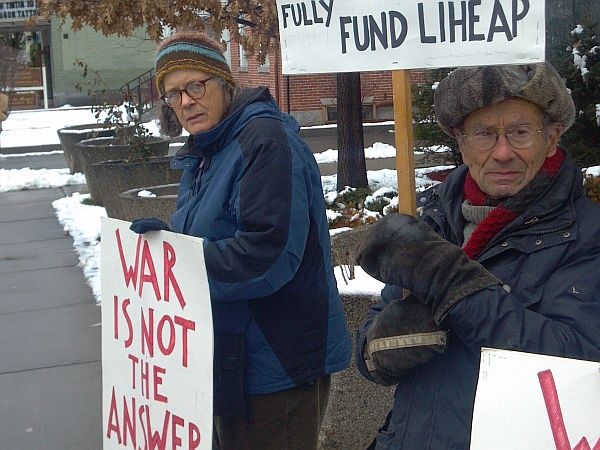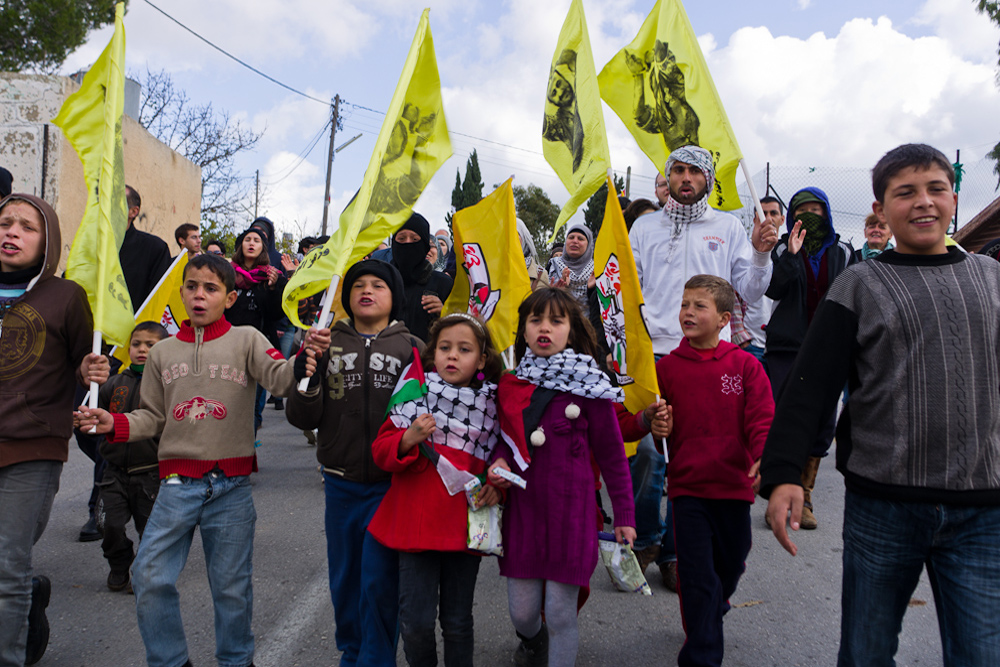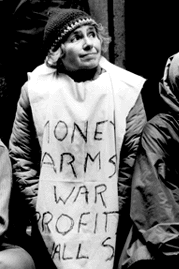Bread and Puppet Theater announces a celebration of the
life of friend and colleague, Bob Nichols. The event will be held
at the Bread and Puppet farm in Glover, Vermont, starting with a
procession and ending with a pot luck dinner. August 20, starting
at 6 PM.
Robert Nichols was a poet and novelist, the author of In the Air, a
collection of short stories, and The Steam Room, a work of comic
fiction, among other works. Mr. Nichols was involved in the
anti-war, anti-nuclear, and conservation movements for decades.
He had a background in landscape architecture and playground
design. The following is the story of Bob's last arrest.
Boots Wardinski, 64, a Newbury farmer and former Marine,
being escorted out of Congressman Welch's Main Street Burlington
office after closing on Monday.
The 'Occupation' Of Rep. Welch's Office, Published 4/1/07
by Robert Nichols
On March 21, I was among the 30 or so protesters who occupied U.S.
Rep. Peter Welch's office in Burlington. Similar actions, part of
the Occupation Project sponsored by Voices for Creative
Nonviolence, have been taking place in other states. The point is
to occupy, or rather take a stand, in the office of a congressional
representative in order to extract a pledge from the congressman.
The pledge? To vote against additional war funding -- in this case,
the spending bill authorizing another $100 billion-plus for the
wars in Iraq and Afghanistan.
In the days before the protest, I learned that some established
Vermont anti-war groups were not taking part in the Occupation
Project. They had met with the congressman and understood his
position. He had campaigned as an end-the-war advocate. Peter Welch
was the wrong target, they thought.
Still, under the circumstances, it seemed wrong not to take some
action. This was a bill to continue the war's funding. The
Constitution was written by persons who were former subjects of
King George III and whose memories were still fresh. The check
against a runaway executive was to grant Congress the power of the
purse. The spending bill, in this case, seemed the last check, a
defining moment.
And so we "occupied" Peter Welch's office. We were greeted
cordially by the staff. It was the day before the vote. We were
told the congressman was busy in committee meetings on Capitol Hill
but would address us by telephone when he came out. A microphone
connected to the telephone was set up on a desk. The 30 of us sat
on the floor in good spirits. There was a song. Then we read out
the names of the dead GIs and Iraqi civilians.
Then Welch got on the phone, and a dialogue began. But as we
learned that the congressman would not take the pledge or say how
he would vote one way or another, the conversation grew more
impassioned and hostile.
The police appeared at the office at closing time -- they were
extremely courteous and good-natured (this is Vermont's most
sophisticated city after all). By that time, just six of us
remained. We followed our plans to be arrested, choosing to leave
in handcuffs. We made our statement to the press.
Still, what we had done left me with an uneasy feeling. I was
disappointed. My guess was that Peter Welch was acting against his
own conscience, a difficult and perhaps agonizing choice, in order
to help the House Democrats maintain discipline and stay united.
Somehow or other, the situation could not be left that way,
however.
The next morning -- this was the day of the final budget vote in
the House, the day for the Democratic majority to get its act
together to pass a measure giving more than $124 billion to fund
the war in order to end the war. This evidently was, in political
and legislative terms, the only and best action. It was still
unacceptable. It was a real disaster for the country and somehow
shameful.
And so two of us went back to Welch's office -- I and another
Thetford resident, Will Allen, an organic farmer -- and announced
that we were there for something that is part of the creative
nonviolent tradition: to fast in order to speak truth to power. We
were to fast until Peter Welch, in a sense speaking to all
Vermonters, made a clear and honest statement of the consequences
of the supplemental funding bill -- consequences that include
further casualties and horrors in Iraq in the coming weeks, months
and year. We would fast until we heard him make that clear and
honest statement.
But actually he could not say what we wanted to hear.
There was another reason for our being there. The reason was to
mourn the passing of our nation's institutional memory. I, myself,
and Will Allen are both old persons. The situation now is the same
as it was at the end of the Vietnam war in 1968-69. That war might
have ended then, but it did not. The reason is that no one in the
administration -- and too few in the country at large --could say
the war was all a mistake. A million Vietnamese killed, tens of
thousands of our own soldiers dead or coming back with terrible
wounds or traumatized by having to kill people in front of their
own houses. All for no reason. All because of a mistake.
We waited and fasted until we heard from Welch. Both Will Allen and
I count ourselves personal friends of Peter Welch. But he could not
admit that there were unspeakable consequences to the bill. He
tried. He wrote out a statement for us. But he couldn't state the
facts.
This is how the "occupation" event was covered in the Burlington Free Press
Six arrested in protest at Welch's office
March 22, 2007 By Sam Hemingway
Six demonstrators were arrested on trespass charges Wednesday night inside the Burlington offices of Rep. Peter Welch, D-Vt., while protesting what they said was Welch’s unwillingness to firmly oppose the Iraq war.
“Last November, we elected a congressman we thought would end the war but instead the war is being expanded,” said Patrick Kearney, 55, of Thetford as he emerged from the building in handcuffs and escorted by police. “We can’t get a yes or no answer from our congressman about whether or not he is going to fund the war.”
The six, all men ranging in age from 27 to 87, were unhandcuffed by police and released after peacefully departing the building. They were told to report to the Burlington Police Department today to receive their arrest citations. The arrests were carried out by three officers, Chief Tom Tremblay and Deputy Chief Mike Shirling.
Later Wednesday night, Welch spokesman Andrew Savage said Welch would prefer that the charges against the six men not be prosecuted. “We’re fine with the charges’ being dropped,” Savage said.
The arrests came after a five-hour sit-in at Welch’s office by 30 demonstrators who were demanding that he oppose a spending bill up for a House vote today that contains funding for the Iraq war.
When the office closed at 6 p.m., the demonstrators were told they must leave or face arrest. Most of the demonstrators chose not to undergo arrests for family and other reasons and left the office, said Michael Colby, 43, of Worcester.
The $124 billion funding bill provides money for war operations but also has language requiring that all troops be out of Iraq by Aug. 31, 2008.
In addition, the bill sets a series of deadlines for turning over military control of Iraq to Iraqi troops and contains guarantees that U.S. combat troops have proper armor before going into battle. The Senate is preparing similar legislation, and President Bush has vowed to veto the measure.
“We are not for this war, and we do not want to pay a dollar more for this war here in Vermont,” Liza Earle of Richmond told Tricia Coates, Welch’s state office director shortly after the group entered the office at 1 p.m. “You cannot fund and oppose this war at the same time.”
At first, the group said they would not leave until they had a conversation with Welch. The group included Vermont state poet Grace Paley of Newbury, perennial Liberty Union candidate Peter Diamondstone of Brattleboro and Dennis Morrisseau of West Pawlet, who ran as the Impeach Bush Now candidate against Welch last year.
As they waited for Welch’s phone call, members of the group discussed their opposition to the war, read the names of American and Iraqi war dead and, at one point, sang the protest song “We Shall Not Be Moved.”
“If he votes for $100 billion for the war, that could have gone for veterans’ benefits,” said Boots Wardinski, 63, of Newbury, who later became one of the six people arrested. “So if he votes for that, he’s saying to the veterans: ‘Screw you.’”
The conversations among the demonstrators and Coates and Welch were mostly cordial. Welch staff members passed out chocolate cookies to the demonstrators, and Buddy, a golden retriever owned by Welch staff member Susan Elliott, occasionally meandered about the room.
At 3:35 p.m., Welch called from his Washington, D.C., office and told the group via speaker phone that he was undecided on the $124 billion military spending bill.
In his remarks, however, Welch appeared to be leaning toward supporting the measure, saying it might be the best way for Congress to mandate a quick, orderly troop withdrawal from Iraq.
“What my decision will be based on is my judgment, and I’ll have to make this judgment as to whether voting for or against the bill is going to hasten the day when we can end this war,” Welch told the group.
Welch also reminded the demonstrators that he supported other strongly worded legislation aimed at ending the war. During his campaign, he often spoke of his opposition to the war and called for the resignation of Defense Secretary Donald Rumsfeld, who did resign after the Democrats won control of Congress in November.
Welch spoke to the group for a half hour but failed to convince them that the bill he remained undecided on had merit. Instead, his stance drew sharp criticism from the group, most of whom said they voted for Welch in November.
“It’s absurd, when I think about it, that my future and the future of other students all over Iraq and Vermont and our country is being compromised because we are pouring all of our resources into a black hole,” said Renee Morley, a University of Vermont student living in Essex.
Wednesday’s demonstration was one of a series of actions backed by the Voices for Creative Non-violence, a Chicago-based group that has staged protests in states around the country to pressure members of Congress to oppose war funding.
The bill that was the target of the protesters has split the anti-war movement. MoveOn.org, a liberal Internet organization, supports the bill. Savage said Welch had received “dozens” of phone calls Wednesday from around the country urging him to vote for the legislation.
In addition to Kearney, Wardinski and Colby, the demonstrators arrested were Bob Nichols, 87, of Thetford; Palmer Legare, 27, of Cabot; and Will Allen, 70, of Thetford.






























